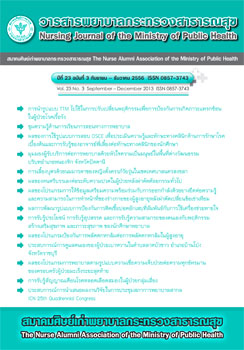การนำรูปแบบ TTM ไปใช้ในการปรับเปลี่ยนพฤติกรรมเพื่อการป้องกันการเกิด ภาวะแทรกซ้อนในผู้ป่วยโรคเรื้อรัง
Main Article Content
Abstract
บทความเรื่องนี้ ได้เขียนขึ้นจากการรวบรวมความรู้ที่ได้จากการทบทวนงานวิจัยและประสบการณ์การดูแล ผู้ป่วยโรคเรื้อรังของผู้เขียน โดยมีวัตถุประสงค์เพื่อเป็นการแลกเปลี่ยนเรียนรู้และนำเสนอแนวคิดของการปรับ พฤติกรรมเพื่อที่จะนำไปใช้พัฒนาแนวทางปฏิบัติในการป้องกันการเกิดภาวะแทรกซ้อนในผู้ป่วยโรคเรื้อรังโดยใช้ แนวคิดของ Transtheoretical model
Transtheoretical model (TTM) เป็นแนวคิดทฤษฎีที่ได้บูรณาการมาจากทฤษฎีทางจิตวิทยาหลายๆ ทฤษฎี มาประยุกต์ใช้ในการปรับเปลี่ยนพฤติกรรมตามขั้นของพฤติกรรมที่ประกอบไปด้วยการประเมินขั้นของพฤติกรรม และการจัดกิจกรรมเพื่อส่งเสริมการปรับเปลี่ยนพฤติกรรมตามความแตกต่างของขั้นของพฤติกรรมของผู้ป่วย ในแต่ละราย ซึ่งพบว่ามีหลายการศึกษาสามารถนำโปรแกรมการปรับเปลี่ยนพฤติกรรมตามแนวคิด TTM มาใช้ ในการปรับเปลี่ยนพฤติกรรมได้อย่างมีนัยสำคัญทางสถิติ
Application of Trantheoretical Model to Complication Prevention in Patients with Chronic Disease
Phanit Leecharoen*
Abstract
This article is written based on knowledge collected from research regarding applied the Transtheoretical model for changing health behaviors and by my patients care experiences. The purposes are to learn and share, and to present the concept as a method to improve complication prevention guidelines in patients with chronic disease.
The concept of Transtheoretical model (TTM) is an integrated concept based on several psychological theories. The process includes an assessment of an individual’s readiness to act on a new healthier behavior, and guide the individual through the stages of change. Several studies have found that TTM program can change bad health behavior to good health behavior to a significant degree.
* Registered Nurse, Boromarajonani College of Nursing Songkhla
Article Details
บทความและรายงานวิจัยในวารสารพยาบาลกระทรวงสาธารณสุข เป็นความคิดเห็นของ ผู้เขียน มิใช่ของคณะผู้จัดทำ และมิใช่ความรับผิดชอบของสมาคมศิษย์เก่าพยาบาลกระทรวงสาธารณสุข ซึ่งสามารถนำไปอ้างอิงได้

